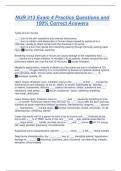NUR 313 Exam 4 Practice Questions and
100% Correct Answers
Types of burn injuries
___ : burn to the skin caused by any external heat source
___ : burn is irritation and destruction of human tissue caused by exposure to a
chemical, usually by direct contact with the chemical or its fumes.
___ : burn is a burn that results from electricity passing through the body causing rapid
injury ✅thermal, chemical, electrical
Breathing noxious chemicals or hot air can cause damage to the respiratory tract. ___
___ injuries are a major predictor of mortality in burn patients. Airway compromise and
pulmonary edema can over the first 12-48 hours. ✅smoke inhalation
Metabolic asphyxiation: majority of deaths at a fire scene are due to inhalation of CO
and ___ ___. Oxygen delivery to or consumption by tissues is impaired causing hypoxia
and ultimately death. Occurs when carboxyhemoglobin blood levels are > ___%
✅hydrogen cyanide, 20
Upper airway inhalation injury: inhalation injury to the ___, ___, and/or ___. Caused by
thermal burns and inhalation of hot air, steam, or smoke. Manifested by: redness, ___
or edema, hoarseness, difficulty ___, copious secretions, stridor, substernal and ___
retractions, total airway ___. ✅mouth, oropharynx, larynx, blistering, breathing,
intercostal, obstruction
Lower airway injury: inhalation injury to ___, ___, and ___ caused by breathing in toxic
___ or smoke. Pulmonary edema may not occur for __-__ hours after the burn and may
manifest as acute respiratory distress syndrome. Manifested by: dyspnea, ____ sputum,
___, hoarseness, ___ mental status. ✅trachea, bronchioles, alveoli, chemicals, 12-48,
carbonaceous, wheezing, altered
Cases that would call for a person to have to go to a burns unit: ___ thickness burns,
burns with >___% of TBSA, burns in the very ___ and __ age, special areas like the
___, major joints, ___, hands, and feet, burns in ___, and ___ burns. ✅full, 10, young,
old, head, genitals, pregnancy, circumferential
Superficial burns characteristics: warmth, ___, ___, moist, ___ is felt, ___ blood vessels
Deep burns characteristics: dry, ____, ___, loss of ___, interstitial edema, hypotension,
damage to ___ ___. ✅blanching, erythema, pain, functional, non-blanching, inelastic,
sensation, blood vessels
,Quick way to assess a burn, the body is divided into areas of 4.5%, 9%, or 18% of
TBSA. This is the __ of ___ chart
front of head ___ % back of head __%
front left arm ___ % back left arm___ % right front arm ___ % right back arm ___ %
anterior trunk ___ % posterior trunk ___ %
genitals/groin area ___%
LFL ___ % LBL ___ % RFL ___% RBL __% ✅rule, nines, 4.5, 4.5, 4.5, 4.5, 4.5, 4.5,
18, 18, 1, 9, 9, 9, 9
___ burns to the extremities can cause compartment syndrome. These kinds of burns to
the chest and back could depress breathing. A fasciotomy is the emergent treatment.
✅Circumferential
___ phase of a burn injury
Time required to resolve the immediate, life-threatening problems. Primary concerns are
onset of ___ ___ and ___ formation. Usually lasts up to ___ hours and it ends when
fluid mobilization and diuresis begins.
Clinical manifestations: respiratory compromise, S/S of hypovolemic shock, Pain, ___
___, shivering, fear. ✅Emergent (resuscitative), hypovolemic shock, edema, 72,
paralytic ileus
complications of respiratory burns
Lower airway burns: check prehospital and ED notes to see if pt was exposed to smoke
or fumes. Fiberoptic bronchoscopy and carboxyhemoglobin blood levels to confirm
suspected ___ ___. Examine any sputum for ___, watch for signs of respiratory
distress, ___ sooner than later. ✅inhalation injury, carbon, intubate
Cardiovascular complication from burn injury
___ ___ due to increased vascular permeability and fluid shifts
____
Circulation to extremities can be compromised and if so can be treated with
escharotomy.
, ___: blood viscosity increases due to blood loss, microcirculation is imapired due to
damage to skin structures that contain small capp systems, corrected with adequate
fluid replacement.
Increased risk for ___, prophylaxis should be started, unless contraindicated.
✅Hypovolemic shock, Dysrhythmias, Sludging, VTE
Urinary system complications with burns
___ ___ ___ (ATN): kidneys tubules are vulnerable to ischemic injury leading to acute
kidney failure. ✅Acute tubular necrosis
Nursing management of airway in emergent phase of a burn injury pt
-Early ___ ___ until edema resolves
-During intubation they are given 100% ___ o2, placed in ___ folwers, encouraged to __
and cough, repositiining ever 1-2 hours, and RN provides ___ and chest physiotherapy
as ordered.
-Within 6-12 hours after injury a ___ ___ is done
-___ of chest to relieve compression
-___ may be used to treat severe bronchospasm.
-CO poisoning treated with ___% ___ until carboxyhemoglobin levels return to normal
✅endotracheal intubation, humidified, high, deep breath, suctioning, fiberoptic
bronchoscopy, Escharotomy, Bronchodilators, 100 oxygen
Fluid therapy nursing management in burn pts
-IV access for fluid and drug administration. Need __ ___ ___ IVs in place for burns > or
equal to ___% TBSA. For burns > or equal to 30% TBSA consider a ___ ___. The
arterial line is placed if frequent ABGs or invasive BP monitoring is needed.
-standardized formula to estimate fluid resuscitation needs. Use ___ solutions (LR), ___
(albumin), or a combination of both. Recommended 2-4 ml of LR/kg/% TBSA burned.
✅2 large-bore, 15, central line, crystalloid, colloids
Parkland (baxter) formula:
__ ml of __ per __ of body weight per percent ___ burned = total fluid requirement for
1st 24 hours after burn.
Application : ___ total for first 8 hours, __ of total in second 8 hours, __ of total in third 8
hours. ✅4, lr, kg, tbsa, 1/2, 1/4, 1/4
Pt with electrical injury fluid therapy: usually have __ fluid need. Usually require ___
diuretic to increase urine output and overcome high levels of hemoglobin and myoglobin
in urine. Urine output should be __-___ ml /kg/hr. ✅greater, osmotic, 0.5-1




